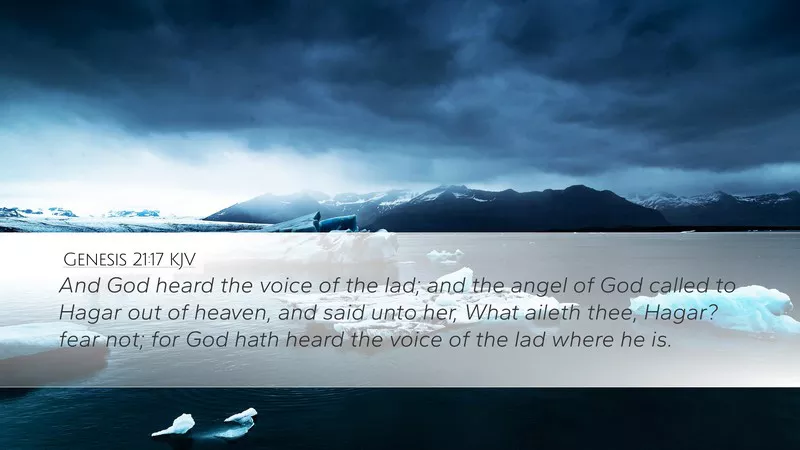Read the Daily Bible Verse – Genesis 21:17 To Strengthen Your Spiritual Journey.
Genesis 21:17 in the King James Version (KJV) reads: “And God heard the voice of the lad; and the angel of God called to Hagar out of heaven, and said unto her, What aileth thee, Hagar? fear not; for God hath heard the voice of the lad where he is.” To appreciate the full significance of this verse, it is crucial to understand the context in which it is situated.
Background of the Passage
Genesis 21:17 is part of a larger narrative involving Hagar and Ishmael. Hagar was an Egyptian servant of Abraham and Sarah. When Sarah, who was initially barren, could not bear children, she gave Hagar to Abraham as a surrogate. Hagar subsequently gave birth to Ishmael, but tensions arose between Sarah and Hagar as Sarah later miraculously conceived and bore Isaac.
Following the birth of Isaac, Sarah saw Ishmael mocking her son and insisted that Abraham send Hagar and Ishmael away to prevent further conflict. Although distressed, Abraham complied, and Hagar and Ishmael were sent into the desert with limited provisions.
Genesis 21:17: The Meaning
Divine Intervention and Compassion
Genesis 21:17 highlights a moment of divine intervention and compassion. Hagar, in her desperation, had placed her son Ishmael under a shrub and walked away, unable to bear the sight of his suffering. At this critical juncture, God hears the voice of the lad and sends an angel to Hagar, providing reassurance and assistance.
God’s Assurance
The angel’s message to Hagar, “What aileth thee, Hagar? fear not; for God hath heard the voice of the lad where he is,” emphasizes God’s awareness and concern for both Hagar and Ishmael. Despite their dire situation, God acknowledges their plight and promises protection and provision. This reassurance is pivotal in highlighting God’s commitment to caring for those in distress, regardless of their social status or circumstances.
Genesis 21:17: Application in Life
God’s Compassion for the Marginalized
Genesis 21:17 serves as a powerful reminder of God’s compassion for the marginalized and vulnerable. Hagar, a servant and an outsider, is given divine attention and reassurance. This passage encourages believers to recognize and emulate God’s compassion in their interactions with those who are struggling or marginalized.
Faith in Times of Despair
For individuals facing difficult situations, Genesis 21:17 offers a message of hope. Just as God heard Ishmael’s cries and provided for Hagar and her son, believers can trust that God listens to their prayers and is present in their times of need. This passage encourages maintaining faith and trust in God’s providence even when circumstances seem bleak.
See Also: Genesis 21:16 Meaning, Context & Commentary
Comparison with Other Biblical Texts
Parallel Stories in Scripture
Genesis 21:17 can be compared with other biblical accounts where God intervenes in times of distress. For instance, in Exodus 3:7-8, God hears the cries of the Israelites suffering in Egypt and promises deliverance. Similarly, in 1 Kings 17:8-16, God provides for the widow of Zarephath during a time of famine through the prophet Elijah.
These stories share a common theme of God’s attentiveness and intervention in times of suffering. They reinforce the notion that God is not distant or indifferent to human suffering but actively engaged in addressing and alleviating it.
Jesus’ Teachings on Compassion
The New Testament also reflects this theme of divine compassion. In Matthew 14:14, Jesus, moved by compassion, heals the sick and feeds the hungry. This mirrors the compassionate intervention seen in Genesis 21:17, highlighting the continuity of God’s concern for human suffering from the Old Testament to the New Testament.
Modern-Day Relevance
Encouragement for the Disheartened
In contemporary society, Genesis 21:17 remains relevant as it offers encouragement to those who feel abandoned or in despair. The verse assures that God hears the cries of those in distress and will provide support and comfort. This assurance can be especially meaningful for individuals facing personal crises, financial difficulties, or emotional struggles.
Inspiration for Acts of Compassion
The divine compassion demonstrated in Genesis 21:17 inspires believers to act with empathy and kindness toward others. It serves as a call to recognize the needs of those who are marginalized or suffering and to offer support and assistance in practical ways.
Conclusion
Genesis 21:17 provides profound insights into God’s nature and His relationship with humanity. The verse emphasizes God’s compassionate intervention during times of distress, His attentiveness to the cries of the vulnerable, and His commitment to providing for those in need. By reflecting on this passage, believers are reminded of God’s enduring presence and support in their lives and are inspired to extend compassion and support to others.
Genesis 21:17 Commentary
Historical and Theological Insights
Historically, Genesis 21:17 reflects the broader narrative of Abraham’s family dynamics and the challenges faced by Hagar and Ishmael. Theologically, the passage underscores key aspects of God’s character, including His omniscience, compassion, and faithfulness. It reinforces the understanding that God’s care is not limited by social status or lineage but extends to all who are in need.
Application in Christian Life
In Christian life, Genesis 21:17 encourages believers to trust in God’s providence and to approach Him in times of trouble. It also calls for practical expressions of compassion, mirroring the divine example set in this passage. By embodying these principles, believers can reflect God’s love and care in their own lives and communities.
In summary, Genesis 21:17 is a powerful testament to God’s enduring care and compassion. Its lessons remain relevant today, offering both comfort and a model for living out divine compassion in everyday life.


